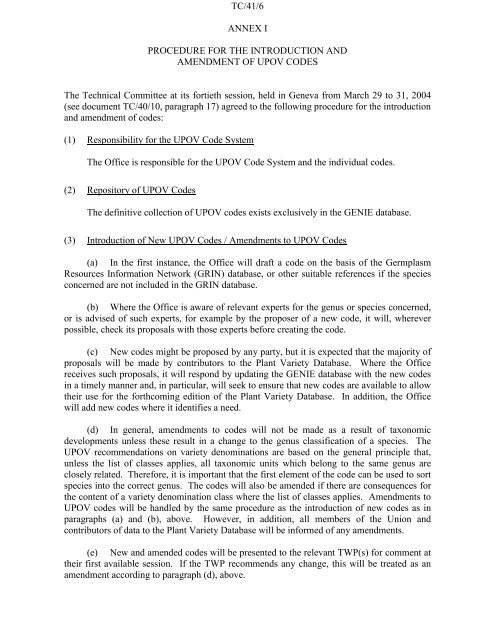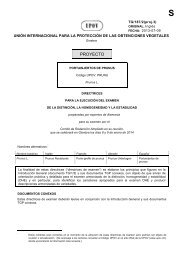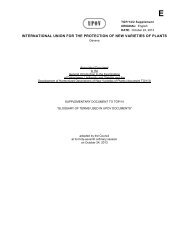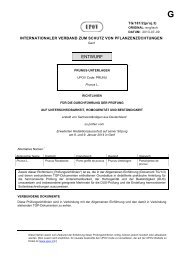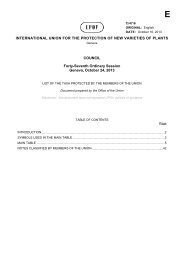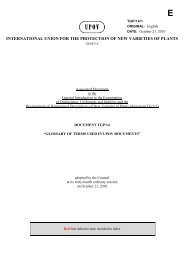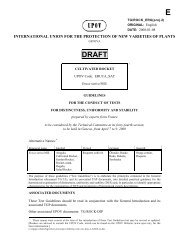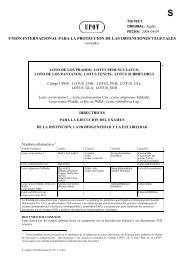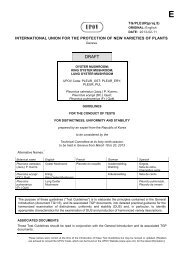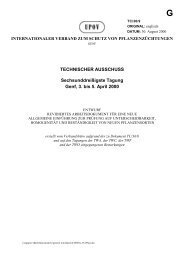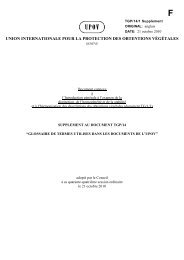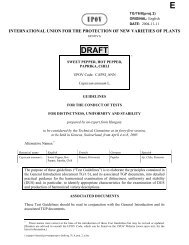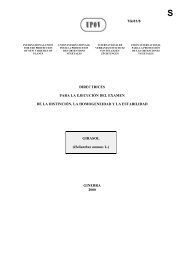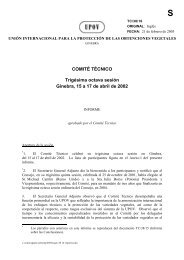TECHNICAL COMMITTEE Forty-First Session Geneva, April 4 to 6 ...
TECHNICAL COMMITTEE Forty-First Session Geneva, April 4 to 6 ...
TECHNICAL COMMITTEE Forty-First Session Geneva, April 4 to 6 ...
You also want an ePaper? Increase the reach of your titles
YUMPU automatically turns print PDFs into web optimized ePapers that Google loves.
TC/41/6<br />
ANNEX I<br />
PROCEDURE FOR THE INTRODUCTION AND<br />
AMENDMENT OF UPOV CODES<br />
The Technical Committee at its fortieth session, held in <strong>Geneva</strong> from March 29 <strong>to</strong> 31, 2004<br />
(see document TC/40/10, paragraph 17) agreed <strong>to</strong> the following procedure for the introduction<br />
and amendment of codes:<br />
(1) Responsibility for the UPOV Code System<br />
The Office is responsible for the UPOV Code System and the individual codes.<br />
(2) Reposi<strong>to</strong>ry of UPOV Codes<br />
The definitive collection of UPOV codes exists exclusively in the GENIE database.<br />
(3) Introduction of New UPOV Codes / Amendments <strong>to</strong> UPOV Codes<br />
(a) In the first instance, the Office will draft a code on the basis of the Germplasm<br />
Resources Information Network (GRIN) database, or other suitable references if the species<br />
concerned are not included in the GRIN database.<br />
(b) Where the Office is aware of relevant experts for the genus or species concerned,<br />
or is advised of such experts, for example by the proposer of a new code, it will, wherever<br />
possible, check its proposals with those experts before creating the code.<br />
(c) New codes might be proposed by any party, but it is expected that the majority of<br />
proposals will be made by contribu<strong>to</strong>rs <strong>to</strong> the Plant Variety Database. Where the Office<br />
receives such proposals, it will respond by updating the GENIE database with the new codes<br />
in a timely manner and, in particular, will seek <strong>to</strong> ensure that new codes are available <strong>to</strong> allow<br />
their use for the forthcoming edition of the Plant Variety Database. In addition, the Office<br />
will add new codes where it identifies a need.<br />
(d) In general, amendments <strong>to</strong> codes will not be made as a result of taxonomic<br />
developments unless these result in a change <strong>to</strong> the genus classification of a species. The<br />
UPOV recommendations on variety denominations are based on the general principle that,<br />
unless the list of classes applies, all taxonomic units which belong <strong>to</strong> the same genus are<br />
closely related. Therefore, it is important that the first element of the code can be used <strong>to</strong> sort<br />
species in<strong>to</strong> the correct genus. The codes will also be amended if there are consequences for<br />
the content of a variety denomination class where the list of classes applies. Amendments <strong>to</strong><br />
UPOV codes will be handled by the same procedure as the introduction of new codes as in<br />
paragraphs (a) and (b), above. However, in addition, all members of the Union and<br />
contribu<strong>to</strong>rs of data <strong>to</strong> the Plant Variety Database will be informed of any amendments.<br />
(e) New and amended codes will be presented <strong>to</strong> the relevant TWP(s) for comment at<br />
their first available session. If the TWP recommends any change, this will be treated as an<br />
amendment according <strong>to</strong> paragraph (d), above.


